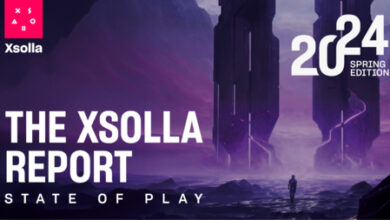NFT Marketplace Development: Building The Future Of Digital Assets

In the ever-evolving realm of digital assets and blockchain technology, NFTs (Non-Fungible Tokens) have emerged as a catalyst for change. These distinctive, indivisible tokens have revolutionized our perspectives on ownership, authenticity, and the transfer of digital assets.
Step into the dynamic realm of NFT marketplace development, where innovation converges with opportunity. Whether you’re an aspiring entrepreneur with visions of crafting your NFT marketplace, a developer eager to delve into the intricacies of the trade, or simply someone intrigued by the NFT landscape, this comprehensive guide will serve as your guiding star on this thrilling journey.
How does an NFT marketplace work?
To make use of the marketplace, you must first register and link your crypto wallet to your account. Following this, a series of steps should be followed:
- Create an NFT and configure all your preferred parameters.
- List your digital items for sale and await moderation completion.
- Buyers submit their bids during auctions.
- Upon auction completion, the marketplace facilitates the transfer of cryptocurrency and digital products.
NFT marketplaces employ specific transaction protocols known as smart contracts. These protocols oversee the interactions between sellers and buyers. Additionally, these smart contracts store pertinent information linked to an NFT. Consequently, the process of buying and selling tokens becomes user-friendly and convenient.
What are the use cases of an NFT marketplace?
There are many use cases your NFT marketplace can represent. We will write down some of the primary use cases in this section.
Art and collectibles
NFTs have revolutionized the art and collectibles world, providing artists with novel means to verify the authenticity and uniqueness of their creations. This innovation secures ownership and authenticity, bolstering trust and value for both creators and collectors. For art enthusiasts, NFTs offer a tangible way to invest in, showcase, and own exclusive pieces of digital or physical art, with the potential for these tokens to appreciate over time. This transformative shift in the art market has ushered in a new era of digital ownership and artistic expression.
Access passes and ticketing
NFTs are revolutionizing the ticketing industry, simplifying and securing ticket purchases. Whether it’s tickets for concerts or sports events, they address persistent issues like counterfeit tickets and unauthorized resale. Each NFT ticket is inherently unique and firmly linked to its rightful owner, ensuring authenticity and curbing fraudulent activity. Event organizers can also embed specific rules within these digital tickets, such as setting minimum and maximum resale prices, giving them greater control over the secondary market and enhancing the overall ticketing experience for fans and attendees.
Real estate
In the realm of real estate, NFTs offer a groundbreaking approach, enabling individuals to claim ownership or a fraction of a property, thereby streamlining real estate asset trading. These tokens simplify transactions by encapsulating all essential data and documentation directly within the digital asset, eliminating the conventional complexities tied to real estate dealings, including the burden of paper contracts and protracted verification procedures. In doing so, NFTs pave the way for a more efficient and agile real estate market, heralding a future where property investments are as accessible as a click or tap.
Gaming
The video game industry has wholeheartedly adopted NFTs, introducing a novel dimension to gameplay by offering one-of-a-kind in-game items such as skins, weapons, and virtual land parcels. These digital assets are tradable, buyable, and exchangeable within the gaming community, infusing an extra layer of worth and interaction into the gaming universe. This not only enhances the gaming experience but also empowers players to transform their in-game accomplishments into tangible real-world value, marking a revolutionary shift in the way we perceive and engage with video games.
What are the benefits of creating your own NFT marketplace?
Versatile development methods
Diversified development methods open up a world of possibilities when creating an NFT marketplace. The vast scope of growth opportunities encourages innovation, allowing for the customization and enhancement of the platform’s user-friendliness and effectiveness. This means you have the flexibility to implement creative, out-of-the-box features, tailoring the platform to cater to specific user needs and preferences.
Implementation of different blockchain
Leveraging blockchain technology, the foundation of NFTs, offers multifaceted benefits within your marketplace. It serves as a versatile tool for various operations, including currency conversion, data verification, trading, and the execution of condition-based protocols. By incorporating different blockchains into your platform, you can optimize processes and enhance functionalities, ensuring the seamless and secure operation of your NFT marketplace across various use cases.
Product awareness
While NFTs are gaining popularity, a substantial portion of the population remains unfamiliar with their potential benefits and trading mechanisms. This knowledge gap presents a significant opportunity for business enthusiasts to educate and engage with a broader audience. By becoming a trusted source of information and insights, you can position yourself as a favored destination for trading, helping people both learn about and profit from the world of NFTs.
Easy development and deployment
Creating and launching an NFT marketplace can be a straightforward or intricate endeavor, much like any other application. Depending on user needs, you may need to establish a robust infrastructure to support NFT transactions. For added functionality, third-party integration can facilitate tasks such as adding, converting, paying, and transferring funds, tasks best left to experienced professionals.
Revenue business generating model
NFT marketplaces offer multiple avenues for generating revenue, given their popularity and reliability. However, realizing their business potential requires a well-structured strategy and effective execution to stand out in the competitive market.
Shedding thoughts
In the realm of NFT marketplace development, we’ve embarked on a journey through innovation, opportunity, and transformation. The potential for NFT marketplaces is limitless, spanning across art, collectibles, real estate, and gaming, offering new horizons for creators and enthusiasts. With versatile development methods, blockchain integration, and a focus on user awareness, this space is ripe for exploration. As we conclude, remember that NFT marketplaces are not just technological ventures; they’re gateways to redefining ownership, authenticity, and value in the digital age. Embrace the future, unlock its potential, and craft your unique presence in this ever-evolving landscape.


